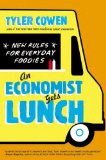Summary | Excerpt | Reviews | Beyond the Book | Readalikes | Genres & Themes | Author Bio

Critics' Opinion:
Readers' Opinion:
First Published:
Apr 2012, 304 pages
Paperback:
Feb 2013, 304 pages
 Book Reviewed by:
Book Reviewed by:
Elizabeth Whitmore Funk
Buy This Book
1. Every meal counts
A bad or mediocre meal is more than just an unpleasant taste, it is an unnecessary negation of life's pleasures. It is a wasted chance to refine our tastes, learn about the world, and share a rewarding experience. Virtually every locale - whether it's Nicaragua, the local suburban strip malls, or an apparently inscrutable Asian-American supermarket - offers some good meals at a cheap price, if only we can decipher their codes and discover the signals for distinguishing good from bad. In discussing how and why every meal counts, certain questions are crucial. How do I choose restaurants? How do I shop for groceries? Do cookbooks really help?
2. Good food is often cheap food
Who has the patience, the time, and the money to take most meals in fancy restaurants? Hardly anyone. But I do want to make my life richer in discovery, especially when it comes to the very human, very basic, and very primeval pleasures of food. I also want to do so as cheaply as possible, precisely because food is not the only good thing in life.
Junk food is cheap, and to a lot of people it tastes good, but junk food doesn't much improve or refine our taste. It gets boring very quickly, and it isn't good for our health or for the environment. Junk food is an attack on the idea of the world as an information-rich treasure, full of surprises and hidden gems and pathways for new learning. Junk food is a dead end.
Furthermore, we don't need junk food because better and cheaper food can be found close to home. In my immediate area - Northern Virginia, Maryland, and Washington, D.C. - my half dozen or so favorite restaurants all offer first-rate meals for fifteen dollars or less, though sometimes of course I decide to spend more. I've been writing restaurant reviews for twenty years, and at the end of the day I prefer their best fifteen-dollar offerings to a typical two-hundred-dollar meal at Michel Richard's fancy Citronelle in Georgetown. These favorite restaurants serve diverse items, ranging from Sichuan dan dan noodles to French Époisses cheeseburgers to red salmon curry to Ethiopian raw beef with chilies and dry cottage cheese. But they all have one thing in common: Their on-site owners and chefs are devoted to food they love to prepare.
It is possible to find this same dedication around the world. The best barbecue cooks of Texas are highly skilled applied scientists; you can find chili ecstasy in Albuquerque diners and sometimes even in pharmacies; and the region in Italy with the fewest Michelin-starred restaurants - Sicily - has some of the best, most surprising, and also cheapest food in Europe. There is a strong commitment to quality seafood at New Zealand fish 'n' chips shops, even if they charge you less than ten dollars for the takeaway experience of carrying out the wrap. In none of these cases do the restaurants expect that their customers are operating with expense accounts. More and more, Paris has a lot of the worst and most expensive food in France.
3. Be innovative as a consumer
Once you have some understanding of the economics that underlie what and how we eat, the power of each of us as individual consumers to improve upon the national and international economy becomes clear.
Typical incomes in America, and in many of the other wealthy countries of the world, have stagnated since about 1973. Could the way we eat help us, at least partially, transcend this sorry state?
We think of innovations as coming from entrepreneurs; and we think of innovations in terms of major life changes, such as electricity, flush toilets, and automobiles - and these do represent very real improvements. Maybe today some of us are still expecting a jet pack, a flying car, or workable robots to ease our household chores, but we'll probably be waiting for a while. Even with the marvelous Internet, the modern world hasn't offered the same quantity of life-changing alternations that were experienced by my grandmother, who was born in 1905. So in an era where technological progress has slowed from its 1870 - 1970 peak, we need to look to a broader concept of innovation. Being a better and wiser consumer is one way we can bring more progress into our lives and so fight back against "the great stagnation" I have written about elsewhere.
Excerpted from An Economist Gets Lunch by Tyler Cowen. Copyright © 2012 by Tyler Cowen. Excerpted by permission of Dutton. All rights reserved. No part of this excerpt may be reproduced or reprinted without permission in writing from the publisher.





The Flower Sisters
by Michelle Collins Anderson
From the new Fannie Flagg of the Ozarks, a richly-woven story of family, forgiveness, and reinvention.

The House on Biscayne Bay
by Chanel Cleeton
As death stalks a gothic mansion in Miami, the lives of two women intertwine as the past and present collide.

The Funeral Cryer by Wenyan Lu
Debut novelist Wenyan Lu brings us this witty yet profound story about one woman's midlife reawakening in contemporary rural China.
Your guide toexceptional books
BookBrowse seeks out and recommends the best in contemporary fiction and nonfiction—books that not only engage and entertain but also deepen our understanding of ourselves and the world around us.